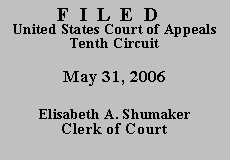

| UNITED STATES OF AMERICA,
Plaintiff-Appellee, v. SHELLEY ANN VANCE, Defendant-Appellant. |
(W.D. Okla.) (D.C. No. 05-CR-208-M) |
Hahn's three-part test requires us to consider "(1) whether the disputed appeal falls within the scope of the waiver of appellate rights; (2) whether the defendant knowingly and voluntarily waived [her] appellate rights; and (3) whether enforcing the waiver would result in a miscarriage of justice." Id. at 1325. The miscarriage-of-justice prong is satisfied if the defendant shows that (a) her sentence relied on an impermissible factor such as race; (b) ineffective assistance of counsel in connection with the negotiation of the appeal waiver rendered the waiver invalid; (c) her sentence exceeded the statutory maximum; or (d) her appeal waiver is otherwise unlawful. Id. at 1327. The government's motion addresses all of these considerations, explaining why none of them undermine defendant's appeal waiver. We agree.
Application of the first part of the Hahn test is straightforward here. On its face, defendant's broadly framed waiver clearly encompasses the judgment and sentence from which she now seeks to appeal. And, indeed, defendant's counsel concedes there is nothing in the record to indicate that the subject of this appeal falls outside the scope of the waiver.(1) Appellant's Response to Appellee's Motion to Enforce Plea Agreement (Appellant's Response), at 1.
Turning to the second part of the Hahn test, regarding the knowing and voluntary nature of the appeal waiver, the government contends the two primary record sources relating to the issue the language of the plea agreement and the Rule 11 colloquy at the plea hearing, see Hahn, 359 F.3d at 1325 do not reflect any deficiencies that would invalidate the waiver. Having reviewed the materials,(2) we agree with that assessment. Moreover, defendant's response concedes that "[n]othing in the record or outside the record indicates [that defendant] did not knowingly or voluntarily enter into the plea agreement." Appellant's Response, at 2 (emphasis added). The appeal waiver clearly satisfies the second condition for enforcement.
Finally, we see no basis on which to find a miscarriage of justice. There is nothing in the record, and nothing noted by defendant outside the record, to indicate that an impermissible sentencing factor was involved, and the sentence imposed was clearly within (indeed significantly under) the statutory maximum. The government notes that defendant has never suggested counsel was ineffective in any way with respect to her plea, defendant's counsel states that he is unaware of any allegations in this regard, and defendant has not personally supplemented counsel's response to claim otherwise. The only remaining basis for finding a miscarriage of justice, i.e., that the waiver is "otherwise unlawful," requires the demonstration of an error that "seriously affect[ed] the fairness, integrity or public reputation of judicial proceedings." Hahn, 359 F.3d at 1329 (citing United States v. Olano, 507 U.S. 725, 732 (1993)). No potential error of that magnitude is evident here. The anticipated appellate issues identified by counsel in response to the government's motion, involving generic objections to "fact finding regarding the employment of the firearm and additional allocution," Appellant's Response at 3, fall squarely within the scope of the issues defendant deliberately waived in exchange for the benefits of the plea agreement. Concerns of fairness, integrity, and public reputation favor enforcement of the waiver.
The government's motion to enforce the appeal waiver in defendant's plea agreement is GRANTED and the appeal is DISMISSED. The mandate shall issue forthwith.
Entered for the Court
Per Curiam
*. This panel has determined unanimously that oral argument would not materially assist the determination of this appeal. See Fed. R. App. P. 34(a)(2); 10th Cir. R. 34.1(G). The case is therefore ordered submitted without oral argument. This order and judgment is not binding precedent, except under the doctrines of law of the case, res judicata, and collateral estoppel. The court generally disfavors the citation of orders and judgments; nevertheless, an order and judgment may be cited under the terms and conditions of 10th Cir. R. 36.3.
1. This court provided defendant with a copy of her counsel's response to the government's motion and gave her an opportunity to supplement it if she wished. She did not. We therefore consider the response filed by counsel to fully reflect counsel's and defendant's combined judgment and agreed position with respect to the matters addressed therein.
2. To fully inform our review of the motion, we obtained the transcripts of the plea and sentencing hearings from the district court.